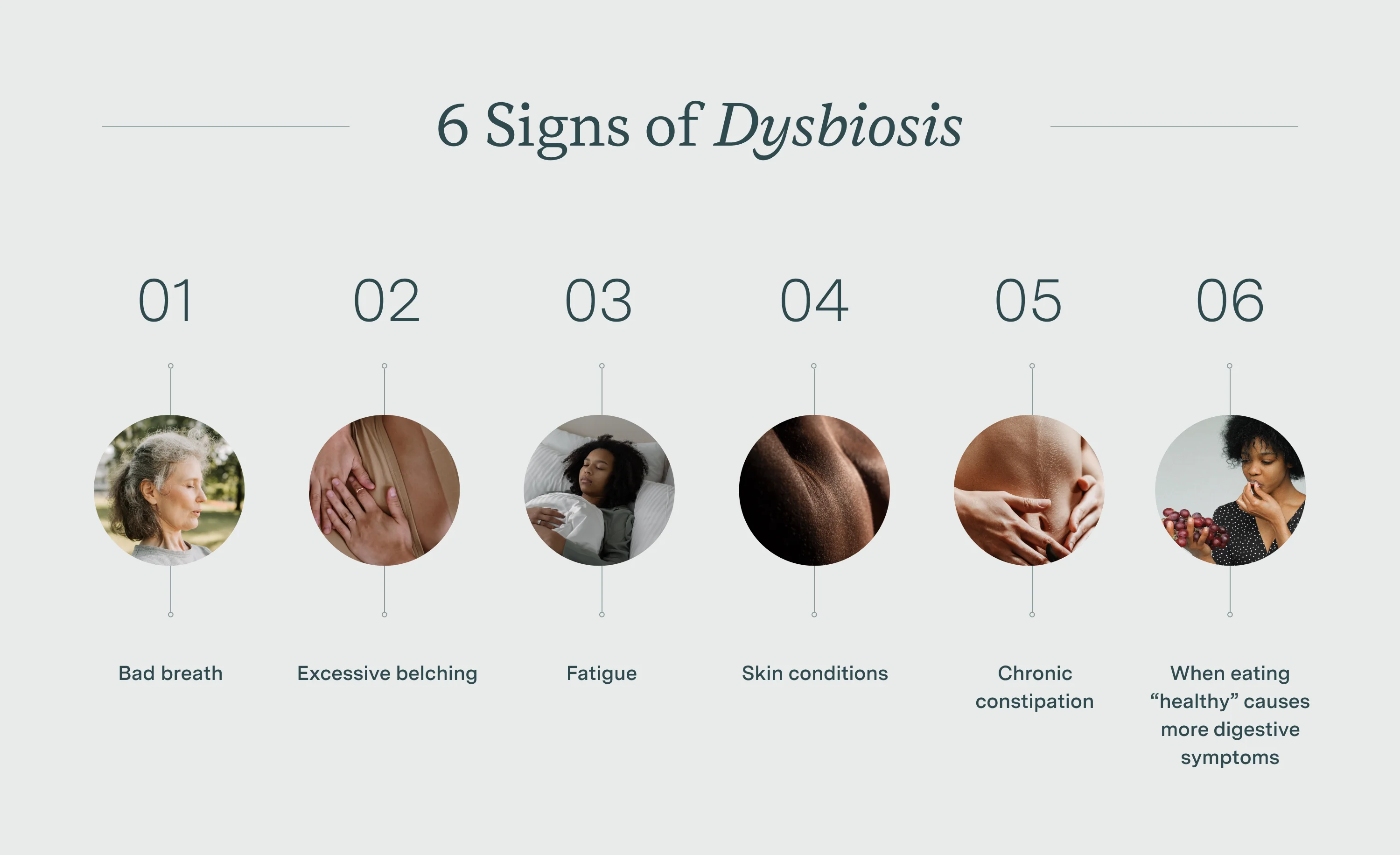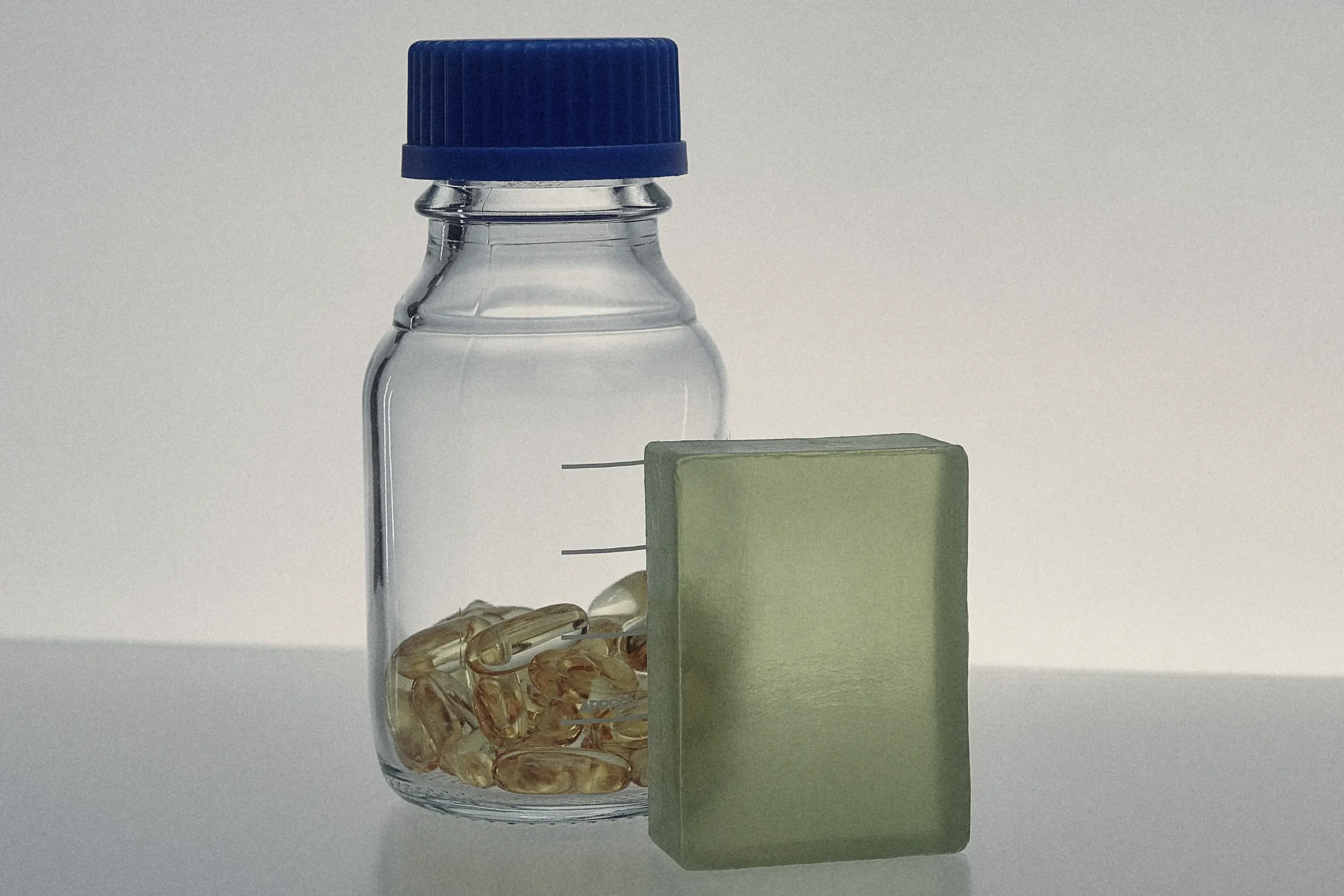Intestinal dysbiosis is a term that increasingly pops up, with its role in bothersome gut symptoms and connections to an increasing list of health conditions. But what is dysbiosis, and how can you tell if this is happening to you? Suppose you don’t have a diagnosed health condition connected to dysbiosis (such as inflammatory bowel disease or irritable bowel syndrome). It can be easy to miss the signs of a gut going awry, especially if you’ve had symptoms for a while. Here, we will review a few sneaky symptoms of dysbiosis and ways to address them. You can also check out our overview of dysbiosis symptoms and resources on the human microbiome for more information.
What Is Dysbiosis?
First, a trick question: What organ helps with digestion, metabolism, creation and utilization of specific nutrients, and immune system function? If you answered the large intestine, you would be mostly right, as the majority of our gut microbiota call the large intestine, or colon, home.
The gut microbiome consists of trillions of microbes and might even be considered an organ in itself, with essential roles in metabolic and immune system functions. The intestinal microbiome comprises bacteria, fungi, viruses, archaea (single-celled organisms without a nucleus), and eukarya (cells with a nucleus). The health of a microbiome is generally based on the diversity and density of its microbes, and a disruption to the microbial composition of the microbiome is considered dysbiosis. (Source)
Dysbiosis is now connected with various health conditions, and not all of them are based in the gastrointestinal tract. Neurodegenerative diseases, type 2 diabetes, skin conditions, hypertension, and autoimmune conditions can all be traced back to the microscopic world in our guts and their vital relationships with our immune systems. (Source)

How Can Dysbiosis Happen?
Our gut microbiomes begin to develop in the womb and can be considered hardy and sensitive. Where you live, how you were born, whether you were breast- or formula-fed, food exposures in early life, use of antibiotics, and exposure to physiological stress all play significant roles in the composition of a developing microbiome. In adulthood, diet, medications, physical activity, and stress continue to influence the abundance and functioning of the microbiome. However, early life is considered to be when your baseline is established. (Source)
While your microbiome is as unique as your fingerprints, there are large groupings of microbes widely shared among humans that are considered to be in equilibrium when present in specific proportions. Disruptions to the balance of gut microbiota can occur either short term, as with a stressful experience or high intensity exercise, or long term, such as after using broad-spectrum antibiotics or consuming a highly restricted diet. (Source)
6 Sneaky Signs of Dysbiosis & What You Can Do
You may be surprised at some of the symptoms that can occur when the ecology of your gut microbes is on the move from a balanced state. Bad breath, excessive burping (or belching), chronic constipation, skin conditions, and exacerbated digestive symptoms after eating many fruits and vegetables can be signs of intestinal dysbiosis. Here, we’ll review 6 common symptoms and offer suggestions for recomposing your gut microbiota.

1. Bad Breath
We’re not talking about forgetting to brush your teeth or the pungent aromas after a garlic-laden meal. But if you struggle with chronic bad breath, or halitosis, you may have to take up the issue with your gut and mouth microbiomes. Mouth odors can occur when bacteria residing in films on the teeth and tongue overproduce smelly compounds.
While it is true the mouth has a microbiome all its own, it is part of the gastrointestinal tract and provides an opportunity for bacteria to enter the body and consequently affect the gut microbiome.
Factors influencing breath include meal composition, fasting, alcohol, drugs, smoking, dental health, and decreased salivation. Bad breath can also indicate serious medical conditions such as liver or kidney failure. In the absence of these conditions, attention to oral and tongue hygiene and identifying (and avoiding) foods that promote odor can be helpful. Additionally, unsweetened probiotic foods (those that contain live beneficial bacteria), such as yogurt, and oral probiotics, such as Weissella cibaria, have shown some benefit in reducing this symptom. (Source, Source, Source)
2. Excessive Belching
Drinking carbonated beverages, overeating, swallowing air, and even anxiety can promote belching, or the release of gas from the stomach through your mouth. When you are belching more frequently than normal and don’t know why, it may indicate an underlying imbalance associated with dysbiosis.
While excessive belching may be caused by an imbalance in bacteria (such as with Heliobacter pylori infection), other causes, such as incomplete digestion (known as maldigestion) can also be a sign of dysbiosis. Maldigestion can happen when you’re stressed, don’t chew food thoroughly, or when you have a deficiency of stomach acid (hypochlorhydria).
A decrease in stomach acid occurs with aging and some health conditions, such as hypothyroidism, due to the thyroid’s involvement in the production of gastric acid. With some conditions, such as gastric ulcers, reduction in stomach acid is desirable. Medications called proton pump inhibitors (PPIs) decrease the production of stomach acid and are commonly prescribed for long-term management of conditions such as gastroesophageal reflux disease.
However, this decrease in gastric acid can lead to slowing of gut motility, or the normal movement of food and bacteria through the digestive tract. Stomach acid depletion can reduce absorption of nutrients and weaken defense against harmful bacteria in the intestinal tract. While there are benefits of using PPIs in the short term, risks of long-term use are not always considered in conventional clinical practice. (Source, Source, Source, Source, Source)
If you are experiencing excessive belching, it’s essential to figure out why. Here are some questions to consider:
- Are you speeding through your meals in 5 minutes or less, or eating while distracted?
- Are you eating gas-promoting foods?
- Are you eating past the point where you feel full?
- Do you often chew gum or drink through straws?
- Are you chronically stressed?
- Are you taking regular medications that suppress stomach acid?
- Do you have a hypothyroid condition?
There is no judgment if you answered yes to any of these questions, but thinking about your responses can help you address potential causes of excessive belching. If you are concerned about medication effects, be sure to check in with your provider before making any changes, and consider consulting with a functional medicine provider to help support optimal digestive function.

.svg)
.png)













.webp)


%2525201%2520(1).webp)
.webp)

.webp)
.png)

%2520(1).webp)









%2520(1).jpeg)

.webp)
.webp)

.webp)

%2520(2).webp)


%25202%2520(1).webp)




.svg)
.svg)